A colon cleanse is a supplemental routine that increases your body’s ability to excrete solid waste from your colon.
If your diet isn’t exactly what it should be, you might be afraid that you’re accumulating toxins or waste products in your gastrointestinal tract, and this is why people turn to colon cleanses.
Some people advocate a mechanical colon cleanse that involves irrigation with an enema kit, but these are fraught with risks.
A less harmful approach is to use a supplement with a mild laxative, dietary fiber, or herbal supplements associated with good colon health. Here are our rankings of the most effective colon cleansing supplements available on the market.
Our advisory panel and our research team rank the best health products and supplements based on performance, label accuracy, and the efficacy of the ingredients in the products.
- Best Overall: VitaBalance Colon Detox Plus
- Best for constipation: Dr. Tobias Colon Cleanse
- Best for women: Kleen IQ Colon Detox & Cleanse
- Super Colon Cleanse
- BioSchwartz Colon Detox & Cleanser
Research
Rankings
Last updated: November 8, 2022
Colon cleanses considered: 18
Hours of research: 41
Experts reviewed: 6
Scientific papers referenced: 15
| IMAGE | PRODUCT | |
|---|---|---|
Best Overall 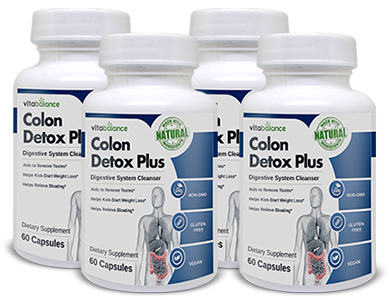 | 1. VitaBalance Colon Detox Plus
| View Latest Price → |
Best for constipation 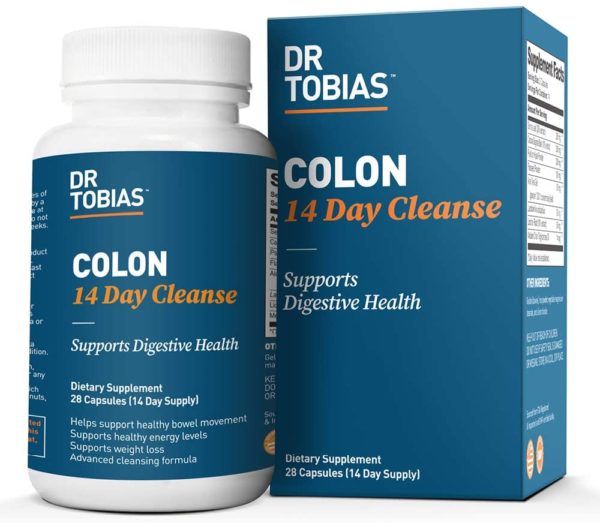 | 2. Dr. Tobias Colon Cleanse
| View on Amazon → |
Best for women 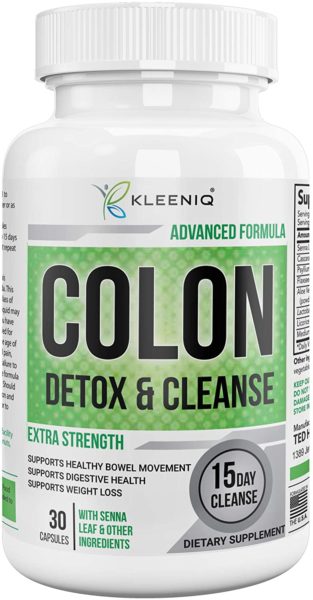 | 3. Kleen IQ Colon Detox & Cleanse
| View on Amazon → |
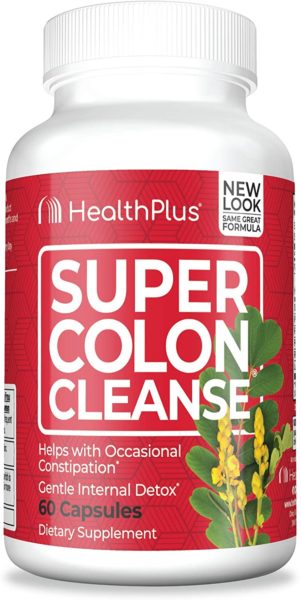 | 4. Super Colon Cleanse
| View on Amazon → |
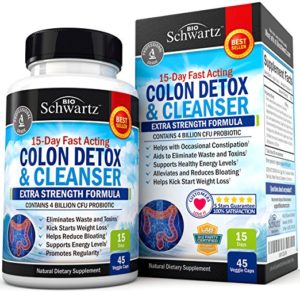 | 5. BioSchwartz Colon Detox & Cleanser
| View on Amazon → |
Best for losing weight 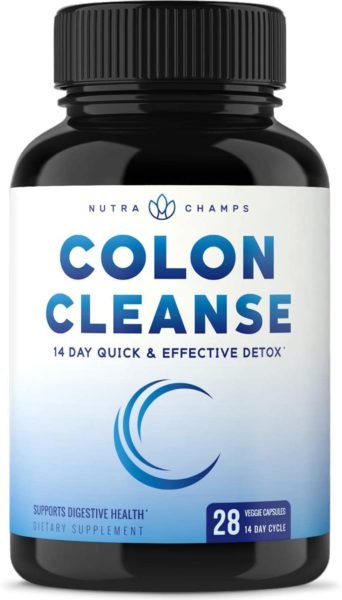 | 6. Nutra Champs Colon Cleanse
| View on Amazon → |
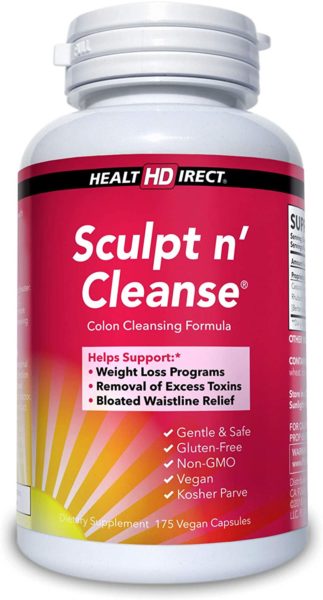 | 7. Sculpt n’ Cleanse
| View on Amazon → |
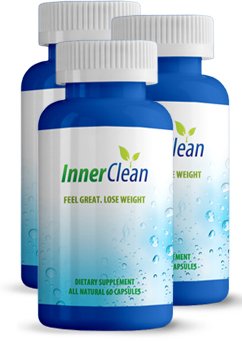 | 8. QFL Inner Clean Capsules
| View on Amazon → |
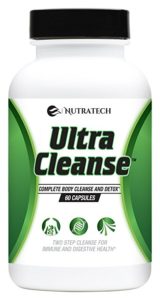 | 9. NutraTech Ultra Cleanse
| View on Amazon → |
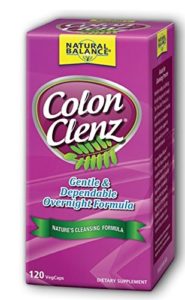 | 10. Colon Clenz
| View on Amazon → |
1. VitaBalance Colon Detox Plus

Click here for the lowest price
“All disease begins in the gut.”
Hippocrates famously said it, and science is finally understanding how true it is…
Especially if you take a lot of medicines like antibiotics, birth control, antacids… are chronically stressed… are exposed to environmental toxins (and who isn’t these days?)… or struggle with poor overall health. All these things stress the colon, so it isn’t able to fully digest your foods and keep you healthy.
That’s why we love VitaBalance Colon Detox Plus. Not only does it flush toxins and waste from your body, it balances the “bugs” in your gut, so your digestive system gets a fresh start.
Why is that necessary?
Because bloating and excess weight are actually symptoms of a toxic gut. Clean it regularly, and you can lose weight, enjoy more energy, and clear out the brain fog.
Colon Detox Plus gives you a powerful blend of the best-known and most trusted ingredients for a healthy colon: psyllium, Lactobacillus acidophilus, rhubarb, gentian, aloe vera, Cascara sagrada, buckthorn, and alfalfa leaf.
Non-GMO. Gluten-free. Vegan. Manufactured in an FDA-registered facility that follows GMP guidelines.
The all-around colon cleanse winner of 2022.
Click here for the lowest price
2. Dr. Tobias Colon Cleanse

The colon cleanse regimen from Dr. Tobias is based around a combination of natural laxative power from senna leaf, oil-based salves for colon health (both aloe vera gel and medium chain triglycerides), and fiber to improve your stool production.
It’s also got probiotics to help repopulate your gut bacteria. Because it covers all the bases when it comes to colon health, it’s a smart choice to safely and effectively clean your colon.
3. Kleen IQ Colon Detox & Cleanse

Kleen IQ makes a well-balanced colon cleanse supplement that includes senna leaf for laxative strength, medium chain triglyceride oil and aloe vera gel to soothe the lining of the colon, lactobacillus acidophilus probiotics, and both psyllium and flaxseed fiber.
A well-rounded colon cleanser like this without any extraneous ingredients is always a solid choice.
4. Super Colon Cleanse

Super Colon Cleanse goes heavy on the herbal supplements, combining the laxative power of senna leaf with a wide array of herbal extracts, from celery seed to rose hips.
These herbal extracts are supposed to support a wide range of factors related to digestive health, but evidence for their efficacy is lacking. The fiber content is pretty good, though, and it’s got acidophilus probiotics too.
5. BioSchwartz Colon Detox & Cleanser

BioSchwartz’s 15 day program goes all in on herbal supplements. The inclusion of aloe vera gel is a nice touch, and like many other colon cleanses it uses senna as its laxative base, but the fact that the ingredients are hidden in a “proprietary blend” makes it tough to analyze in detail how effective it will be.
On the other hand, it does have two different kinds of probiotic bacteria, versus just one in most other competitors.
6. Nutra Champs Colon Cleanse
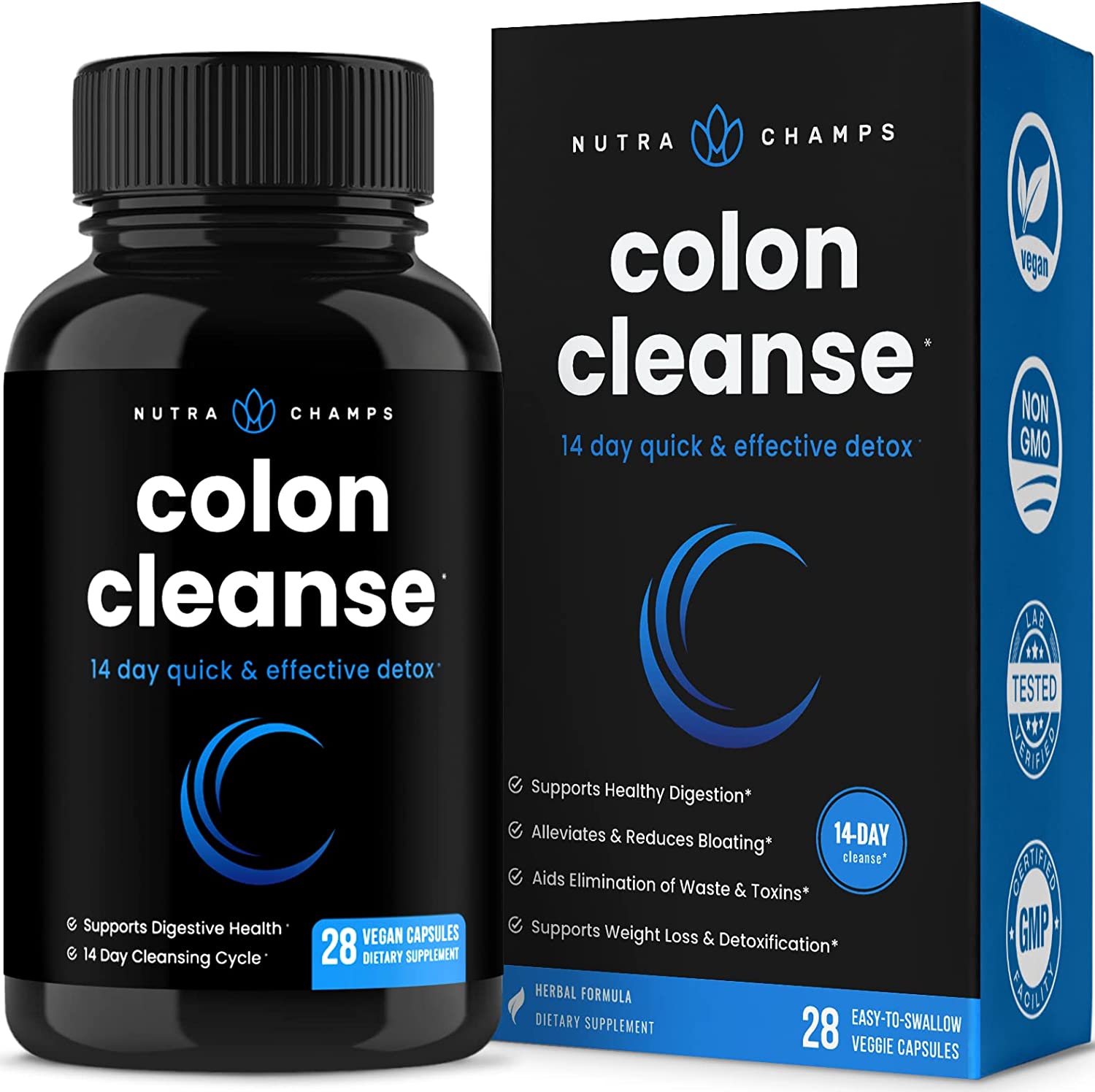
This 14-day routine has a solid balance of laxatives, fiber, probiotics, and herbal extracts designed to soothe the gut.
It’s a strong pick if your goal is supporting your gut bacteria, especially if you are starting a diet to lose weight. There’s very little to complain about with this colon cleanse supplement.
7. Sculpt n’ Cleanse
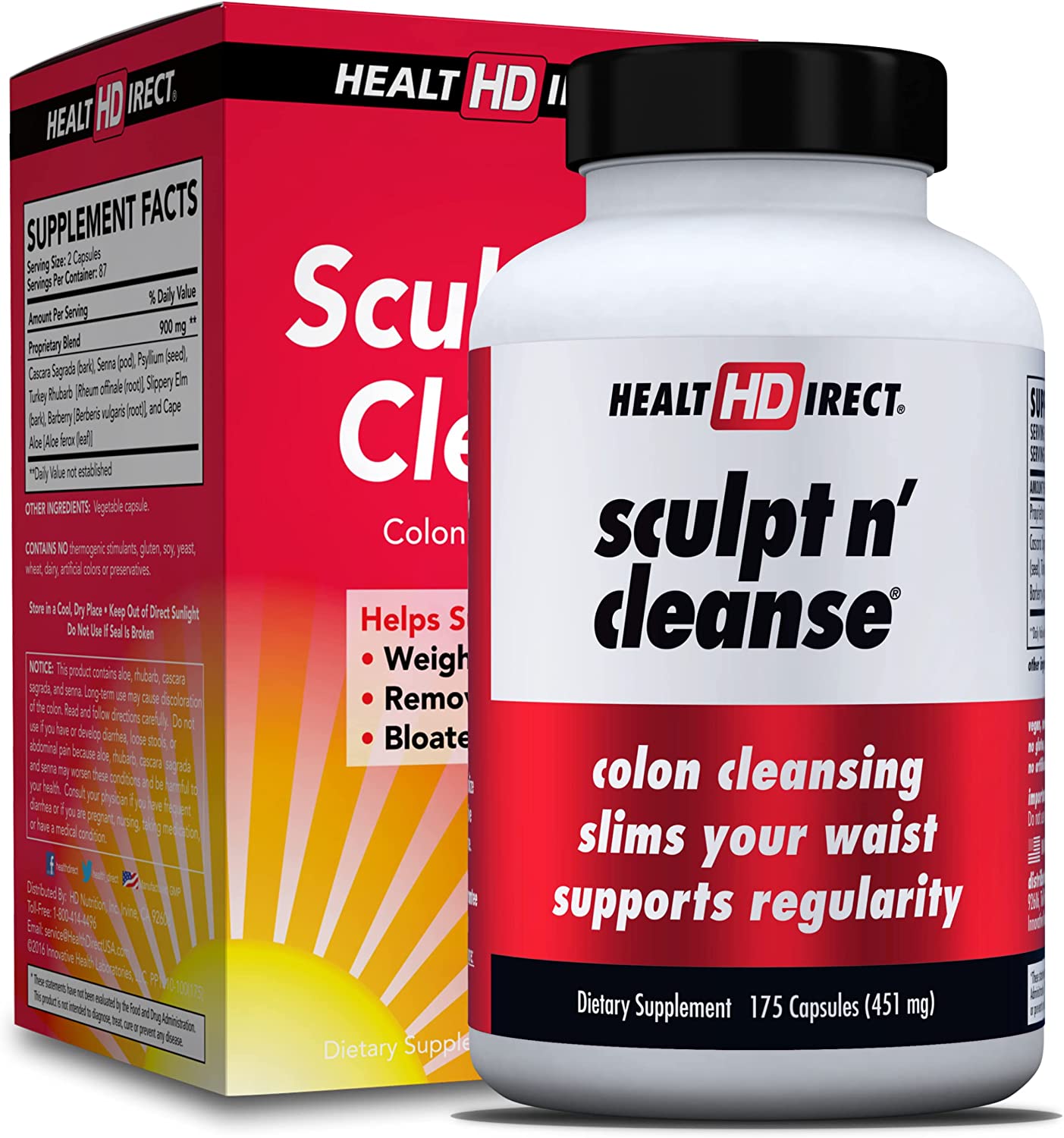
Sculpt n’ Cleanse, despite the name, doesn’t actually include much in the way of weight loss supplements; it’s mostly a laxative with some herbal ingredients for colon health.
Senna leaf provides the main laxative power, alongside buckthorn extract for additional laxative effects and a host of other herbal remedies. There is some aloe vera gel, but not much else in the way of oils, nor are there any probiotic ingredients.
8. InnoSups Inno Cleanse
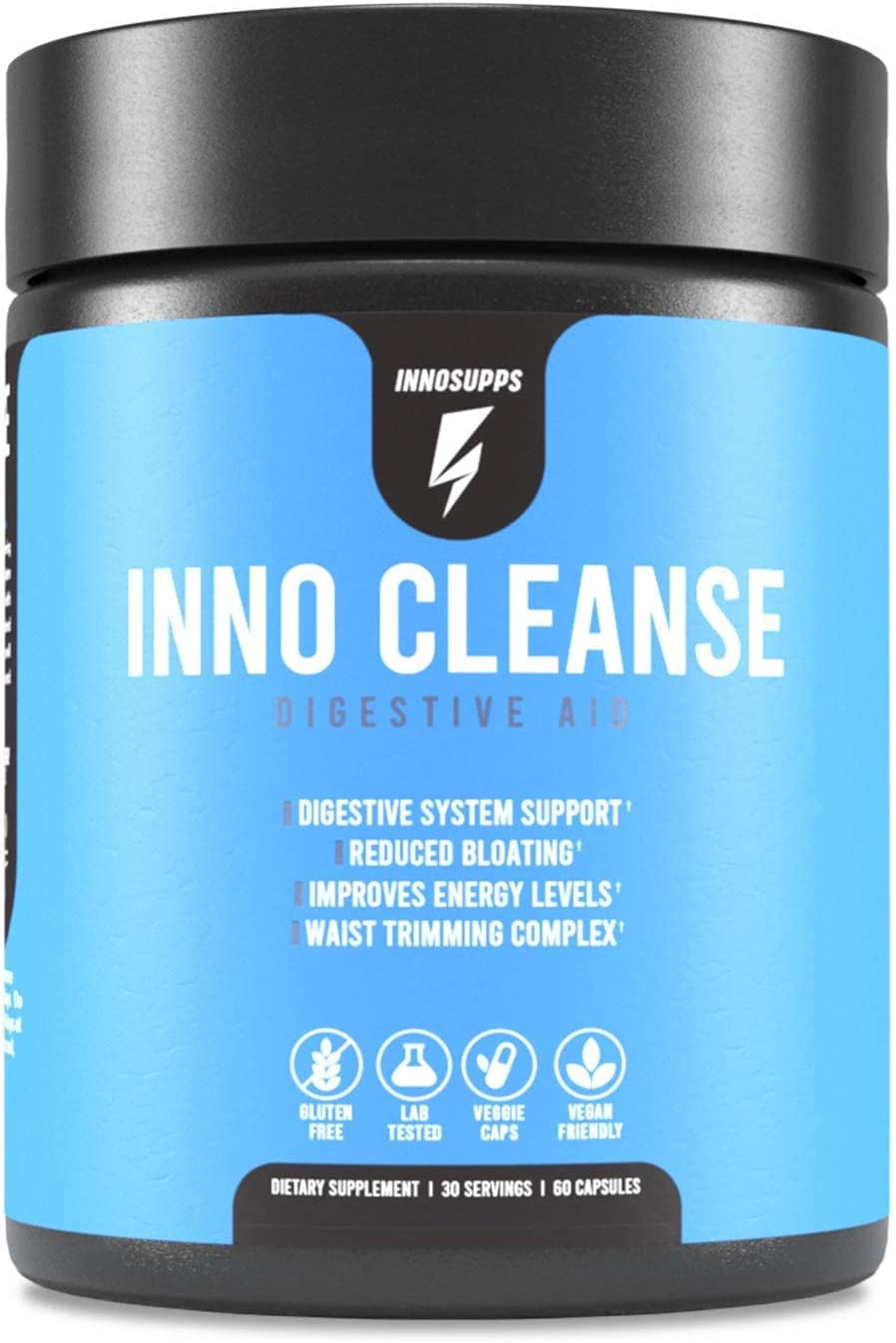
Inno Cleanse takes a broader view of colon cleansing, using ingredients like herbal extracts that exert a laxative effect, like cascara sagrada and senna, plus additional herbal extracts for liver and gut health support, like milk thistle and burdock root.
The formulation is a bit unconventional, but it might be worth a try if more mainstream colon cleanses aren’t doing the trick for you.
9. NutraTech Ultra Cleanse

NutraTech has some quality ingredients, but unfortunately they’re all at the bottom of the list of their “proprietary blend” ingredients. Senna, prune juice, and flaxseed oil are all great, but they are among the least prevalent ingredients in the blend.
Plus, we don’t know the absolute amount of these ingredients. This calls the efficacy of this supplement into question, even though there aren’t any issues with the ingredients themselves.
10. Colon Clenz

Colon Clenz includes senna, buckthorn, and aloe vera, but the other ingredients are pretty forgettable obscure herbal extracts. The absolute amount of herbal extracts included is pretty small, too, so the likelihood that this will be effective is diminished because of this.
Category winners
Best colon cleanse overall: VitaBalance Colon Detox Plus
VitaBalance is an all-around winner thanks to its wide range of all-natural fiber and naturally-sourced laxatives. This 15-day colon cleanse is the best option for improving gut function and digestive health.
Best colon cleanse for losing weight: Nutra Champs Colon Cleanse
Want to kick-start a weight loss program with a colon cleanse? Nutra Champ is the way to go. With two sources of fiber (psyllium husk and flaxseed), plus lactobacillus probiotics, it’s well-outfitted for cleaning out your system and supporting your gut microbiome as you start a new diet.
Best colon cleanse for constipation: Dr. Tobias Colon Cleanse
Dr. Tobias includes an effective dose of two natural laxatives, senna, and cascara sagrada bark. Thanks to this combination, it’s a powerful but gentle way to clean up constipation.
Best colon cleanse for bloating: Dr. Tobias Colon Cleanse
In addition to its ability to treat constipation, Dr. Tobias is a great pick for cutting down on bloating thanks to its use of probiotics to out-compete gas-producing bad bacteria in your gut, and aloe vera gel to soothe your stomach and improve waste clearance.
Best colon cleanse for women: VitaBalance Colon Detox Plus
VitaBalance has a nice combo of laxatives, soothing agents, and vitamins and minerals that make it a great pick for many of the gastrointestinal issues women face, whether that’s constipation, cramps, gas, or bloating.
Who should buy a colon cleanse?
Colon cleanses are a specialty supplement that have formulations that are dialed in for a few specific types of people:
People with common gastrointestinal complaints. Colon cleanses are formulated to help with bloating, gas, water retention, and cramps, which can be caused by constipation or poor gut bacterial health. A colon cleanse can hit the reset button on your GI tract and helping you get your gut health moving in the right direction.
People who want to improve the regularity and quality of their bowel movements. While a colon cleanse won’t quite “remove toxins” overnight like some products and manufacturers might like to believe, the right combination of fiber and herbal extracts can boost the speed of your digestive tract, helping to move food through your intestines more rapidly and with more regularity.
If you need to shock your system back into regular bowel movements and kick start a healthier diet and supplementation routine for your gastrointestinal system, taking a colon cleanse supplement could be a good way to get started.
People who want a safer alternative to colon irrigation. Colon cleanse supplements are also a much safer and preferable alternative to a mechanical colon cleanse, also sometimes referred to as a colon irrigation. If you are thinking of a colon cleanse, opting for a supplemental product is probably a safer bet than a mechanical procedure.
How we ranked
We based our colon cleanse recommendations on the best scientific evidence to date. Here were our criteria:
No unsafe mechanical procedures or enemas. Because of the risks associated with mechanical methods of colon irrigation, we excluded any enema-based mechanical colon cleanse. This rapidly narrowed the field of products eligible for our rankings to only herbal and fiber-based supplements.
More than just a fiber supplement. We also dropped any supplement that contained only fiber. While fiber supplements can be great for your gastrointestinal tract, we required our colon cleanse supplements to go beyond the benefits of just a fiber-based solution.
Safe herbal laxatives with a low risk of dependency. Next up, we looked to see which of the remaining colon cleanse supplements contained safe and high-quality herbal ingredients like senna, which have a laxative effect but have a low risk of side effects or dependency.
All else equal, it’s far better to rely on a tried and tested ingredient like senna, versus less well-understood laxative herbs. The risk with these other kinds of ingredients is that they may not work, or they may work too well and make your body reliant on them to have a bowel movement.
Transparent ingredient listings and simple supplement design. We penalized products that obscured the purity and dosage of their active ingredients using a proprietary blend, and likewise penalized products that used too many artificial flavors, colors, or binding agents in their formulations.
The last thing you want when you’re trying to clean out your digestive tract is to have unnecessary extras in the supplement you are taking.
Additional benefits from ingredients that support healthy gut bacteria. After evaluating the quality of the herbal ingredients in the colon cleanse supplements on our list, we turned our attention to important extras, like probiotics and prebiotics.
A colon cleanse is great, but how do you ensure your gastrointestinal tract stays healthy after the immediate effects of the cleanse have worn off. The products that wound up high in the rankings were those that included probiotic strains and/or prebiotic nutrients to help the healthy bacteria in your gut flourish.
FAQ
Q: What is a colon cleanse?
A: A colon cleanse is a supplemental that flushes out your gastrointestinal tract and improve GI problems like constipation or indigestion.
Supplemental colon cleanses use a combination of ingredients to induce bowel movements and also aim to improve the health of your gastrointestinal tract.
These supplements include compounds such as psyllium husk or other sources of fiber, plus herbal laxatives like senna and potentially probiotic bacteria or prebiotic nutrients.
Q: Can you lose weight with a colon cleanse?
A: You might lose weight in the immediate aftermath of a colon cleanse, but the weight you lose is going to be mostly water weight.
Much like taking a diuretic, when you do a colon cleanse and drop a few pounds, you aren’t losing the kind of weight you want to lose—in order to actually burn off fat, you’ll need to change your diet, increase your physical activity levels, and possibly consider supplements for weight loss.
On the other hand, when you flip the equation around, there does seem to be a connection with being overweight or obese and having poor gastrointestinal health. Children who are obese, for example, are much more likely to have constipation compared to children who have a healthy weight (1).
Q: How can you naturally cleanse your colon?
A: Natural ways to cleanse your colon include increasing the fiber in your diet with more fruits and vegetables (or a fiber supplement), drinking more water, or taking a natural herb-based colon cleanse that uses a compound like senna, and possibly natural fiber sources like psyllium husk, to cleanse your colon.
Even better, opt for a supplement that has some probiotic bacteria and prebiotic nutrients so you can repopulate your gastrointestinal tract with a good gut microbiome.
The effect is not so much to “flush out toxins” as it is to overcome constipation, get back in a routine of regular bowel movements, and re-establish a healthy equilibrium in your gastrointestinal tract (including your colon).
Q: Will a colon cleanse detox your body?
A: The concept of “detoxifying” your body is an unfortunate one, since the science of gastrointestinal health is a lot more sophisticated than simply trying to eliminate unspecified toxins.
The idea of “toxins” has some basis in truth; early research indicated that having large and regular bowel movements may help reduce the risk of colon cancer, by diluting the bile acids that accumulate from your intestines (2).
However, this effect is a lifelong consequence of regular bowel movements, which are more about a healthy diet, physical activity, the presence of healthy gut bacteria, and high fiber intake.
A colon cleanse might be able to nudge you in this direction by jump-starting your body, but to maintain a healthy gastrointestinal tract, you need to establish regular health habits that contribute to a healthy colon.
Q: How does a colon cleanse work?
A: A colon cleanse supplement first helps your body have a bowel movement, likely through the inclusion of a natural laxative such as senna, and often also thanks to the inclusion of a source of fiber like psyllium husk.
In addition, a good colon cleanse supplement will help re-establish healthy gastrointestinal function by repopulating your gastrointestinal tract with probiotic bacteria, and potentially also including prebiotic nutrients to help these probiotic bacteria flourish.
From here, it’s up to you: after a colon cleanse, maintaining a healthy colon depends on a good diet, physical activities, and useful extras like a good source of probiotic bacteria and high-quality fiber.
Related articles
- Heavy metal detox
- Fiber
- Psyllium husk
- Juice cleanse
- Detox tea
- Green superfood drink
- Probiotic
- Digestive enzymes
Recap
Using a colon cleansing supplement can help improve your gastrointestinal health on several fronts. The laxative effect in colon cleansing supplements can treat constipation, helping to prevent toxins from sitting around in your colon and causing damage.
Soothing agents like aloe vera gel can fight inflammation and may even be able to stimulate healing in your colon tissue, and fibers from psyllium or flax can improve the frequency and quality of your bowel movements.
To repopulate the healthy gut bacteria in your gastrointestinal tract, look for a colon cleanse that has probiotics, or take a separate probiotic supplement.
For BodyNutrition‘s #1 colon cleanse recommendation, click here.